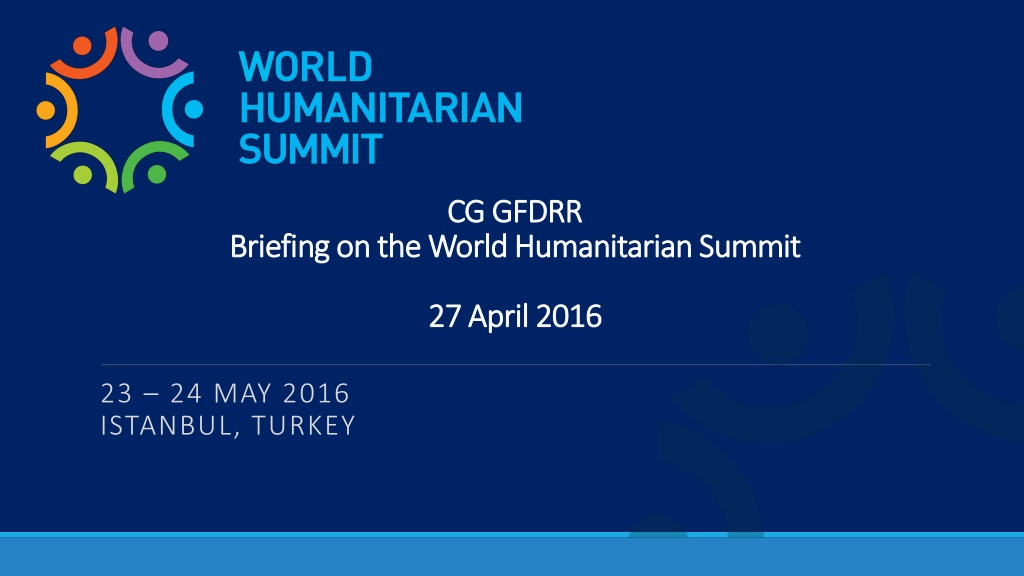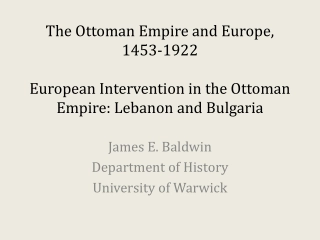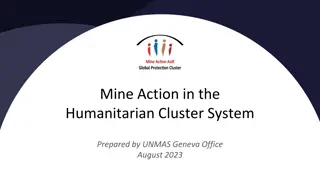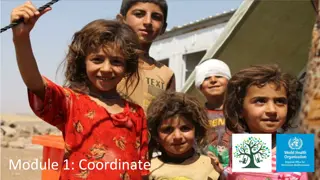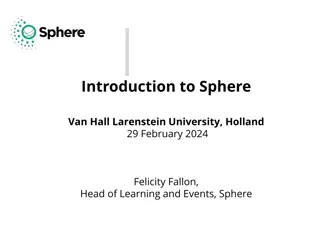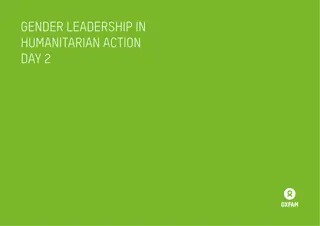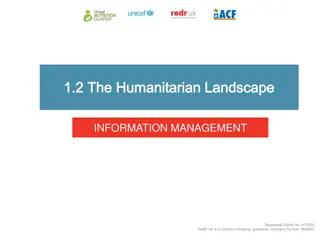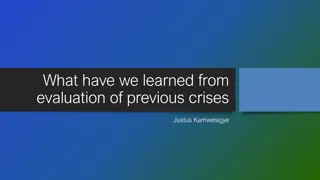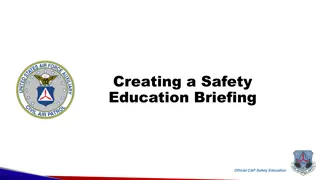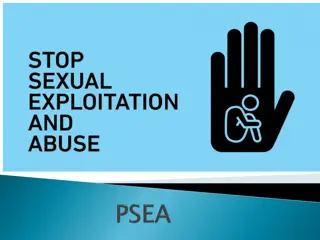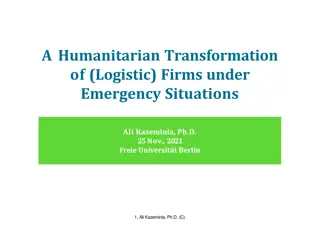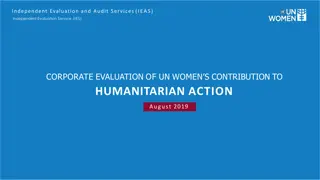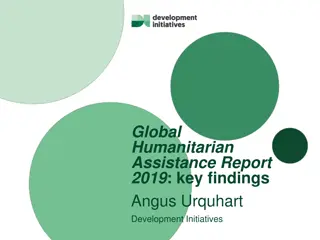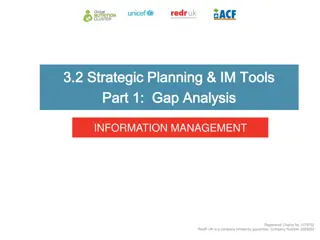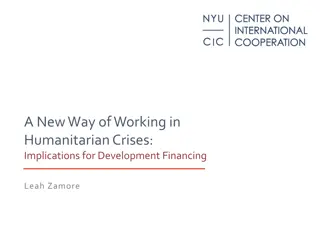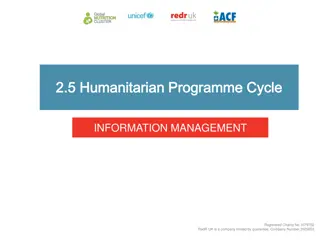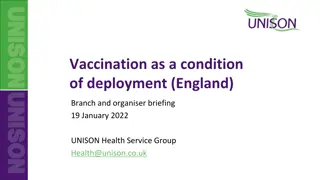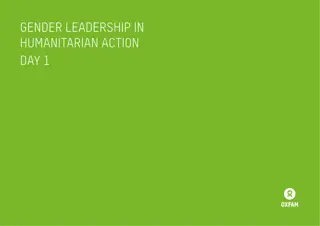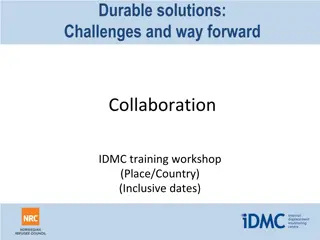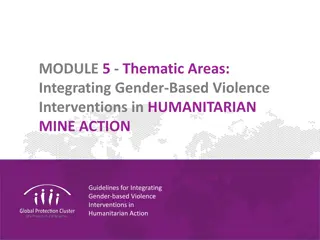Insights from the World Humanitarian Summit Briefing
The World Humanitarian Summit, held in Istanbul, Turkey, saw significant participation and contributions. Key topics included consultations, core responsibilities, roundtable discussions, and commitments to address global challenges such as forced displacement, gender equality, and climate change. The event emphasized the importance of political leadership, innovation in aid delivery, and financial investment in humanitarian efforts. The Summit highlighted the need for collective action to address crises and uphold the norms that safeguard humanity.
Download Presentation

Please find below an Image/Link to download the presentation.
The content on the website is provided AS IS for your information and personal use only. It may not be sold, licensed, or shared on other websites without obtaining consent from the author. Download presentation by click this link. If you encounter any issues during the download, it is possible that the publisher has removed the file from their server.
E N D
Presentation Transcript
CG GFDRR CG GFDRR Briefing on the World Humanitarian Summit Briefing on the World Humanitarian Summit 27 April 2016 27 April 2016 23 24 MAY 2016 ISTANBUL, TURKEY
WHS Consultation WHS Consultation Process Process 440+ written submissions 5,500+ comments 23,000+ people received online consulted 151 countries from which participants added their voices 8 regional consultations 2 9/23/2024
The SGs Report and Agenda for Humanity Launched on 9 February 2016 Builds on consultations and presents 5 core responsibilities Provides the framework for the High-Level Leaders Rountables and Leaders Segment
5 core responsibilities & 7 roundtables RT2 - UPHOLD THE NORMS THAT SAFEGUARD HUMANITY RT3 - LEAVING NO ONE BEHIND: A COMMITMENT TO ADDRESS FORCED DISPLACEMENT RT6 - CHANGING PEOPLE S LIVES: FROM DELIVERING AID TO ENDING NEED RT7 - HUMANITARIAN FINANCING: INVESTING IN HUMANITY RT 1 - POLITICAL LEADERSHIP TO PREVENT AND END CONFLICTS RT4 - WOMEN AND GIRLS: CATALYSING ACTION TO ACHIEVE GENDER EQUALITY RT5 - NATURAL DISASTERS AND CLIMATE CHANGE: MANAGING RISKS & CRISES DIFFERENTLY
Roundtables Key opportunity for leaders to announce substantive, transformative pledges to action Two hours long with 30 to 50 speakers Short interventions focused on commitments. SG/DSG will serve as moderators Two or more co-Chairs
Making commitments Two types of commitments 1) Core commitments: intentions to work in a new way, to strengthen an area of work, visionary in nature 2) Individual or joint commitments (including by regions or groups): Concrete, measurable actions
Disasters & Climate Change Natural hazards are having major impacts on lives, livelihoods and economies. Improvements have been made in recent years in building peoples resilience. Climate change, urbanization .will increase the frequency and intensity of disasters. Accelerate Sendai, SDGs and COP agreements to reduce and adapt to disaster risk. Ensure events don t spiral out of control: invest in national & local preparedness.
Three major shifts Anticipate, don t wait for crises. Take collective action. Reinforce, don t replace, national and local systems.
RT5: Disasters: Core commitments Commitment 1: Commit to accelerate the reduction of disaster and climate-related risks through the coherent implementation of the Sendai Framework for Disaster Risk Reduction 2015-2030, the 2030 Agenda for Sustainable Development and the Paris Agreement on Climate Change, as well as other relevant strategies and programs of action, including the SIDS Accelerated Modalities of Action (SAMOA) Pathway. Commitment 2: Commit to reinforce national and local leadership and capacities in managing disaster and climate-related risks through strengthened preparedness and predictable response and recovery arrangements. Commitment 3: Commit to improve the understanding, anticipation and preparedness for disaster and climate- related risks by investing in data, analysis and early warning, and developing evidence-based decision-making processes that result in early action.
Disasters: Core commitments (Cont..) Commitment 4: Commit to increase investment in building community resilience as a critical first line of response, with the full and effective participation of women. Commitment 5: Commit to ensure regional and global humanitarian assistance for disasters complements national and local efforts.
Examples of individual & collective commitments Commit to support the OCED DAC in rapidly completing the work to have arrangements in place to track official finance flows to disaster risk reduction and preparedness, with a view to setting a target for increased investment at the next Global Platform for Disaster Risk Reduction. Commit to join a new coalition to strengthen the resilience of 1 billion people by 2025. Commit to strengthen national and local emergency management systems for natural disasters, and accelerate this initially in the most at-risk countries, so they reach a minimum level of readiness by 2020. (Global Preparedness Partnership)
Post-Summit Commitments need to be implemented and lead to genuine change in the way we deliver assistance and reduce risk and vulnerability for millions of people. All commitments registered for a Roundtable will be reflected in the Commitments to Action document. After the Summit, there will be an expectation that States and stakeholders who have made commitments will want to report on their implementation. A process is being developed to track progress on implementation. Further information will be provided in due course. There will also be a number of inter-governmental and non-intergovernmental opportunities to take forward the outcomes of the Summit and the recommendations of the Secretary-General in his next report to the General Assembly.
Post-Summit opportunities ECOSOC Humanitarian Affairs Segment: 27-29 June President of the General Assembly events, including High-Level Thematic Debate on Human Rights and Humanitarian Affairs: 12-13 July Annual General Assembly omnibus humanitarian resolution: Fall 2016 General Assembly Summit on Addressing Large Movements of Refugees and Migrants: 19 Sept. Quadrennial Comprehensive Policy Review (QCPR) negotiations: Fall 2016 Global Platform for DRR (May 2017)
Any Questions? 15 9/23/2024
